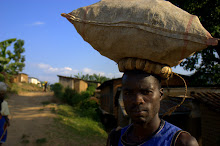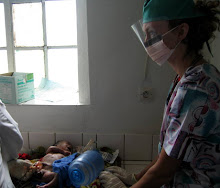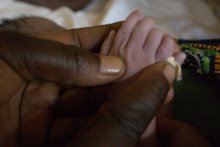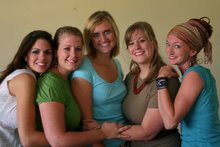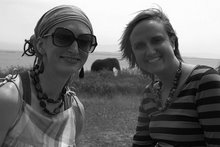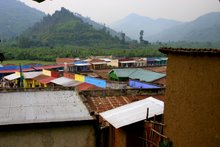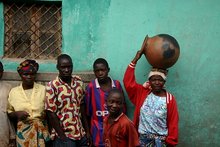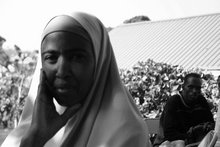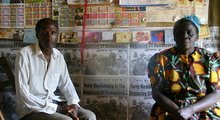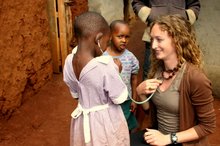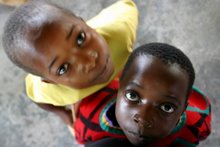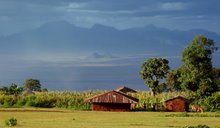Wednesday, May 30, 2007
Donation
Another $400 was donated to the school's orphan fund that enables 12 students a year to attend who are missing parents. The funds were running short, so this was a great start.
If you'd like to donate more, there are always needs. Please contact me at thisiserika@gmail.com and I can let you know ways to wire the money there.
Thanks again! Kongoi missing! Asanti sana!
Back to Sang'alo
 In 2005 I got to teach at Mariann Primary School in a small village: Sang'alo, Kenya. While Ellen took a trip to visit the churches in Gulu, Uganda, she set me loose to go back and visit and see any patients there. Going back brought so many wonderful memories to mind. I got in around 8 pm. As I walked to a classroom, I heard an expectant gasp from inside where they saw my headlamp. I opened the door, and there was the 2nd grade class that I used to teach P.E. They all jumped up screaming, "Erika"! They ran over to encircle me and we just jumped up and down and up and down before I could think to formally greet them.
In 2005 I got to teach at Mariann Primary School in a small village: Sang'alo, Kenya. While Ellen took a trip to visit the churches in Gulu, Uganda, she set me loose to go back and visit and see any patients there. Going back brought so many wonderful memories to mind. I got in around 8 pm. As I walked to a classroom, I heard an expectant gasp from inside where they saw my headlamp. I opened the door, and there was the 2nd grade class that I used to teach P.E. They all jumped up screaming, "Erika"! They ran over to encircle me and we just jumped up and down and up and down before I could think to formally greet them.Living in this village was not an act of sacrifice or being a saint: it was a privaledge. The Nandi people are truly the most hospitable people on the planet. They took us in as their own. They are unpretentious, hard-working, farming country-folk who display the most heart-felt hospitality I've ever experienced. I consider myself fortunate to have part of my life invested here, and plan to visit again and again. During this visit I really did not have a free moment: as soon as I visited one family, another family invited me over for the next meal.
 The students are so hard-working. School is a privilege that the families sacrifice to pay for as well as their only way out of poverty. These are girls from the class I taught English, CRE, Science, and nutrition to. I had made up songs about nutrition, AIDS, and a drama about the prodigal son. They preformed them for me!!!
The students are so hard-working. School is a privilege that the families sacrifice to pay for as well as their only way out of poverty. These are girls from the class I taught English, CRE, Science, and nutrition to. I had made up songs about nutrition, AIDS, and a drama about the prodigal son. They preformed them for me!!!
For about $10 I got a bulk supply of Albendazole, a de-worming tablet. Studies have shown that students in Africa who take this pill have significantly more growth and better school performance than students who don't. I got to play Doctor and de-worm the whole school. After explaining to the classes what it was they all started cheering, especially the part when I mentioned better test scores. Even the teachers were excited: many telling me they had never been de-wormed before.

This is Standard 8. They will sit for the exams this year that will determine if they can go on in their schooling. I'm so proud of them: They are so bright!!! I got to teach them some "medical lessons". They asked questions like, "If I mostly eat Ugali and Sukuma (greens) why is my blood the color red when I cut myself?" They asked about Diabetes and Heart Attacks and could keep up with all my explanations.
Friday, May 25, 2007
Night in the Museum
Our afternoon clinic patients did not show up, so I went to the
The picture is of a knife used to do a C-section in 1879. Eleven days after the surgery the patient had completely recovered.
Orthopedic Hospital



Today we went to the
After a quick tour of the workshop for making casts and walkers and braces we greeted the children. Then we saw some very interesting cases. The first child was 7 months old and had hydrocephalus. A doctor noticed his large head circumference a few weeks after his birth and he was sent to the country’s hospital. However the hospital was backed up and he did not receive treatment for months. Finally a shunt was installed to drain his CSF from being clogged in the brain to his stomach area. When we saw the boy he was comatose and would not follow our fingers with his eyes. He also had a hydrocele (a descended bag of fluid into the scrotum). So I preformed my first real testicular exam on a comatose infant--not a bad way to start! It is a tragedy that brain damage has occurred because the hospital was not able to treat him in time.
The second child really shocked me: the 2 month old baby boy was less than 4 pounds!!! The mother unwrapped this tiny creature that only had one finger on each hand and whose arms were kept retracted because of radial malformation. He was very pale, and Ellen ordered a CBC because she suspected pancytopenia. It is most likely that the mother had syphilis, toxoplasmosis, or rubella early in the pregnancy that effected his growth. The hands are formed by the 8th week, so her infection was probably before she really knew she was pregnant. We ordered a VDRL on the mother. Syphilis is very common here.
We also saw a boy with cranisynathosis. He had an “egg shaped” head because his skull bones had fused and his brain could not grow with his body. He obviously had brain damage because he was mostly unresponsive. The mother had abandoned the boy, and now the grandmother was taking care of him. This is common in
The time there was very touching. Despite the sad conditions of some of our cases, it was encouraging to see all the children getting treatment. If not for this hospital children all over the country would lack the attention to overcome their conditions.
Thursday, May 24, 2007
A typical day
Ellen lives on a hill several miles from the middle of the city. It is a nice home with running water and electricity half the time--a lot nicer than we were used to in Kenya. Traffic in
Most patients are members of the church. There is a large refugee population. I thought it was interesting that she also had a stock of antidepressants. Many refugees have been through so much trauma that they suffer Post-traumatic Stress Syndrome. Ellen gets them involved in the church’s bible study groups, and amytriptilene has a sedative side effect so it helps them get some sleep.
Patients are seen daily, with Ellen’s only day off on Monday. A lot of time is also spent ordering medicines and taking care of church business—and answering all my questions! I come home and do a lot of reading. Ellen has a small library of books on infectious diseases that I pour through. My favorite one is the book on African dermatology. I fall asleep looking at pictures of nasty skin lesions. I miss visiting homes, so at least once a week I try to stay the night with someone from the church. This past Monday I had a really good time staying with some girls who live in a nice slum near the clinic. They took me to a "Gospel Club" where we got to do some dancing. They were great and I can't imagine coming here without experiences like those.
Tomorrow we'll visit an Orthopedic hospital, one of the odd jobs for Ellen. Then, in about a week, two doctors and some others from
This weekend Ellen is going with a team to do a survey of the north for a church plant, so I’ll take off to visit my old school in Kenya and do lectures and give out medicines there. I was able to purchase a stockpile to take them for only 20 USD. Visiting my old students and home will the highlight of my stay here.
Wednesday, May 23, 2007
African medicine
Yesterday we saw a 40 yo Somali man. He had urinary urgency. We tested his urine which only showed a very high specific gravity, which is normal for Africans who have chronic dehydration. We encouraged him to drink more water, but clean water costs money, so simply education does not solve the problem. With the differential, we figured the most likely cause was Benign Prostatic Hypertrophy. In America you would consider prostate CA in your differential, but it would be no use to test for it here because even if he did have it, nowhere in the country would treat him for that, even in here in the capitol city, and at 40 he is considered to have lived a full life. We did not do a rectal exam. Even though this wpuld have been good medicine, a Somali man would not culturally accept two women sticking their fingers up his butt.
We did not have an alpha-blocker to treat his condition, but we did have an old Tricyclic Antidepressant that has a side effect of urinary retention. So we gave him this and if it works, he can come back for more.
Taking a social history....
Somali
I have been able to get to experience real "family medicine". Families come into the clinic and members are taken care of one by one. Today a Somali refugee woman came in with seven children and an interpreter. The woman's husband had died when he went on a business trip to Ethiopia and was accused of being a spy and tortured to death. She had her own children and her brother’s children to take care of. The whole group was coughing. It seemed like that they were suffering from an URI that could be taken care of with Amoxicillin. However, we were not sure about the mother having TB. She wasn't able to afford a $4 TB test.
Congo
A Congolese man came for fever and malaise. His story was fuzzy about whether he had actually gotten a blood smear to prove malaria. Ellen decided to give him Doxycyclin: it's a treatment for malaria (an older one), and also a treatment for typhoid and some STDs, so it can cover a lot of the differential.
Ellen pointed out a bump on the back of his head. In 2004 he had been beaten. He had a scar across the head and on the back of his head was a bump where some meninges had come through his skull fracture and was stuck there after it healed. The Congo is a very dangerous, violent place. This man had most likely done nothing: beaten by an angry cop or in a small battle.
Northern Ugandan Orphans
Last night for dinner a girl I went to school with was over. She is working as a counselor with teenage orphans that had been captured by the Lord's Resistance Army in Northern Uganda. The LRA is notorious for capturing children and making them part of the Army. As part of the army they were forced to carry heavy bags of artillery on their heads and trained to kill or be killed. Resting or complaining was not tolerated and resulted in them getting shot. Some escaped during skirmishes, not knowing how to get back home or if they would be caught and killed by the LRA.
Jennifer has spent time talking with them about great fears and hopes. The culture here is does not encourage sharing thoughts and emotions, even with such seriously painful histories. Recently she got them to draw pictures of their greatest fear. One guy wanted his picture to be shared: it was a picture of a man and woman lying dead on the ground with blood flowing from their heads. The hut was on fire with a chicken squawking in the air, and in the background were tall grasses were separated by children marching in line carrying loads twice as big as them on their heads.
For more information on the LRA check out www.invisiblechildren.com
Sunday, May 20, 2007
Another healer in Kampala: Benny Hinn
This weekend the legendary pastor and faith healer Benny Hinn was in town. One of Ellen's patients gave a testimony in church about his healing. He had been diagnosed and was being treated for hypertension. He also had "a pain in his R side and L arm". (We're not sure if the pain was from angina, MI, or TIA...or something else) But at the event prayers were offered for a miracle and his pain went away, and he concluded saying, "So now I can stop my medicine."
Acknowledgement and credit given to the spiritual world and powers pervades
I think of this different paradigm a lot while I pass stores called, "Praise Supermarket" or "Allah bicycle repair and salon" (I'm not making this up!!) or see billboards announcing the next big visiting pastor that preys on the faith of the people. It seems silly until I meet a refugee whose difficult life is hopeful and meaningful because of their faith.
Whether one sees a reliance on the spirit world as good or bad--simple-minded or intuitive--is almost irrelevant. The fact is that the culture is deeply immersed in spirituality and providing care must be based around this: a balance between medicine and faith.
case: Pertussis
A 36 yo woman came in with her 9 month old baby. The woman has "suffered from cough" for months and now her child is also suffering. She has been to the doctor and received an African version of the antibiotic Bactrim and medication for a cough syrup. However, she only had enough money to buy a weeks supply of each. She came to Ellen and had a fit of coughing in the room. It was very violent and hard to watch. She said that her baby also coughs until he vomits.
The history was consistent with pertussis, also known as whopping cough. The coughing is paroxysmal and violent, often leading to vomiting, and it has lasted over a month. She had already been on a quinolone and Bactrim which don't completely cover the bacteria causing pertussis. It was transmitted easily to her child making it most likely an infectious etiology.
On auscultation I could definitely hear wheezes and rhonchi, but no crackles, ruling out pneumonia. She also had an Xray that ruled out TB and showed no infiltrates.
Pertussis is caused by either B. pertussis or B. parapertussis, both respond to erythromycin. In infants there is a significant risk of death. In the United States children are immunized for this disease with the DPT vaccine.
Friday, May 18, 2007
Salama: a heart surgery case from Sudan

Salama, a one-year-old from a small Sudanese village was very sick when they met Dr. Ellen Little in a hospital in northern Uganda. Ellen mentioned she would see the child if they were ever in Kampala. Sure enough, they took her up on the offer and came looking for her months later.
Salama was missing an entire septum between her atria, not just a defect. Ellen didn't hear a murmur since the entire septum was gone, but the clinical presentation gave her a clue that the child was suffering from heart failure: failure to thrive, enlarged liver from hepatic congestion, displaced spleen and liver, diaphoresis, tired easily, tachypnea. An echocardiogram confirmed the diagnosis, but pediatric open heart surgery was not available in East Africa, so Ellen could only offer to write doctors in the U.S.
People in the states agreed to raise money and doctors agreed to the surgery. Salama's parents could not accompany her because they could not get visas as Sudanese citizens, and her father could not get a passport since he was fighting against the government of the North. Ellen took the child on plane to the states, and it was a miracle that the baby survived the trip (especially since Ellen couldn't nurse her!). They performed the operation, but in the process destroyed the SA node, the pacemaker of the heart. So an artificial pacemaker was installed and Salama returned to her war-torn village after an intense surgery.
Now she is three years old, and we received a call that while on digoxin she had overdosed: she was vomiting. Ellen advised them to get her to a hospital, but because of the distance, they took her to a small clinic that did not understand what was going on. Then next morning they got to the hospital with Ellen's urging, and were transfered to a heart hospital. However, they were lost in the shuffle and never made it there either until Ellen found them. She has been released from the hospital and we'll see them tomorrow.
getting there...


The cheapest ticket is not the most direct route to get somewhere: it took three days of air travel to get to Uganda. From Albuquerque to NYC to Hamburg to Dubai to Addis Abbaba and finally Entebbe!
While in NYC my friend Jordan came to send me off at the airport. We had spent the last 5 months together in Sang'alo, Kenya together. I know it was hard for her to send me off without joining, and it was hard to imagine being there without her: we both love Africa, and made a good team. Feeling like a parent, she urged me to be safe and prayed fro wisdom for me to maneuver all the potentially dangerous situations. When I gave her a hug goodbye, I started crying. Suddenly I was overwhelmed with how blessed we have been to have had the experiences in Africa that have effected us so. She stayed and we shared McFlurries and more memories of Kenya and plans to return before I had to really go.
I had a 12-hour layover in Dubai. I decided to make the most of it, and got in touch with a French engineer through the couchsurfing network. He took me out to see the city. It was the most modern airport I'd been to, yet the workers were dressed in traditional white, full-length garments. I felt as though I'd entered a movie-set of a futuristic world. The streets of Dubai are 12-lane highways lit up with billboards 6 stories high. Bruno took me past the world's tallest building that is still under construction and then to a beach with a view of the famous 7-star hotel. There were still people everywhere even thought it was midnight. We went to a fabulous shopping center and past an indoor ski slope (constructed in the middle of the desert!) At the shopping center everyone was dressed in designer clothes and elegant jewelery (well, except me). We also go tot see the 'Palm Island' that is a totally man-made construction in the ocean.
The odd thing about the city is that the extravagant wealth and development is not overshadowing a layer of poverty: there is no poverty in the city, no homeless population, no beggars. Furthermore, there is no crime. Bruno told me that we could have very easily left the car unlocked at the beach, even with the engine running, and no one would have touched it. He could only think of one crime he had heard of lately while living there: Russians had attempted to break into a jewelry store, but were caught. I asked him if the low crime rate was a result of strict punishment or high security, and he said, "Stealing is not in their mentality." He thinks that eventually crime will become part of the culture, but for now it is not a problem.
Apparently this unique place is a result of a very high work ethic, no taxes (which draws in foreign business), investments in oil (even though the oil sales are not directly part of their economy), government paying for all citizens to be educated and attend training outside of the country, and the city planners' vision.
I thought it was interesting that with their wealth and relentless construction, there is no interest in environmental protection. Bruno told me that on the beaches he finds coral that has been blasted from the construction offshore. Even though we were in the middle of the desert, fake rivers surrounded the shopping center to carry ornate boats with lights. Where he works he said there is an escalator that runs all day even though only 2 people are there to use it: a reflection of their mentality of unlimited resource.
So in conclusion,
1) Dubai is the oddest place I've ever been. It's ironic that I saw it on the way to Africa because with its exotic affluence and lack of poverty, litter, and crime, it is the antithesis of where I'll be next.
2) Couchsurfing, once again, has treated me well. Check it out: it's the best website in this diverse world.

